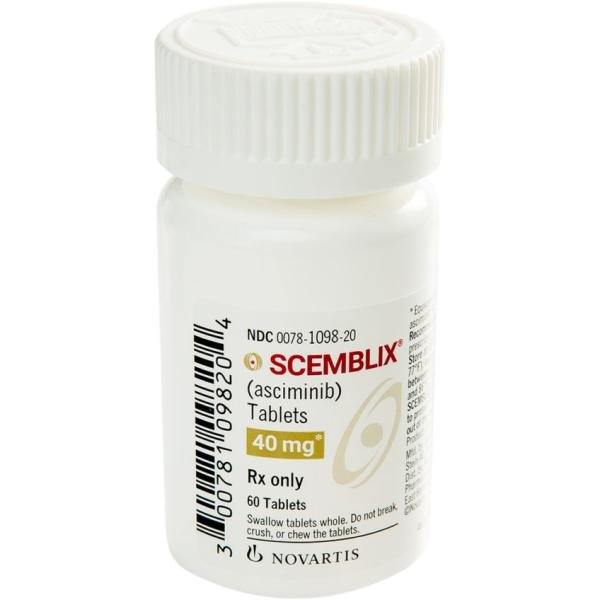Scemblix and Alcohol/Food Interactions
There are 2 alcohol/food/lifestyle interactions with Scemblix (asciminib).
Asciminib Food
Moderate Food Interaction
ADJUST DOSING INTERVAL: Food may reduce the oral bioavailability of asciminib. When a single 40 mg dose of asciminib was administered with a low-fat meal (400 calories; 25% fat) in healthy volunteers, asciminib peak plasma concentration (Cmax) and systemic exposure (AUC) decreased by 35% and 30%, respectively, compared to asciminib administered in the fasted state. Administration with a high-fat meal (1000 calories; 50% fat) decreased the Cmax and AUC of asciminib by 68% and 62%, respectively.
MANAGEMENT: To ensure adequate asciminib exposures, food consumption should be avoided for at least 2 hours before and 1 hour after taking asciminib.
References
- (2021) "Product Information. Scemblix (asciminib)." Novartis Pharmaceuticals
- (2022) "Product Information. Scemblix (asciminib)." Novartis Pharmaceuticals UK Ltd, Scemblix 20 mg film-
Asciminib High Blood Pressure (Hypertension)
Moderate Potential Hazard, Moderate plausibility
asciminib - hypertension
The use of asciminib may cause hypertension. Blood pressure should be well-controlled prior to initiating asciminib and treated as needed with standard anti-hypertensive therapy. For persistent hypertension despite anti-hypertensive medications, temporarily withhold, reduce dose, or permanently discontinue therapy, based on the persistence of hypertension.
References
- (2021) "Product Information. Scemblix (asciminib)." Novartis Pharmaceuticals
Scemblix drug interactions
There are 697 drug interactions with Scemblix (asciminib).
Scemblix disease interactions
There are 3 disease interactions with Scemblix (asciminib) which include:
More about Scemblix (asciminib)
- Scemblix consumer information
- Check interactions
- Compare alternatives
- Pricing & coupons
- Drug images
- Side effects
- Dosage information
- During pregnancy
- FDA approval history
- Drug class: BCR-ABL tyrosine kinase inhibitors
- En español
Related treatment guides
Drug Interaction Classification
| Highly clinically significant. Avoid combinations; the risk of the interaction outweighs the benefit. | |
| Moderately clinically significant. Usually avoid combinations; use it only under special circumstances. | |
| Minimally clinically significant. Minimize risk; assess risk and consider an alternative drug, take steps to circumvent the interaction risk and/or institute a monitoring plan. | |
| No interaction information available. |
Further information
Always consult your healthcare provider to ensure the information displayed on this page applies to your personal circumstances.


